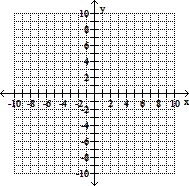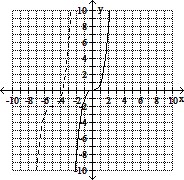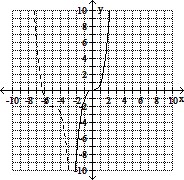Determine the x values that cause the function to be (a) zero, (b) undefined, (c) positive, and (d) negative.f(x) = 
A. (a)  , (b) ?, (c)
, (b) ?, (c)  ? (5, 7), (d)
? (5, 7), (d)  ? (7, ?)
? (7, ?)
B. (a) {5}, (b)  , (c)
, (c)  ? (7, ?), (d)
? (7, ?), (d)  ? (5, 7)
? (5, 7)
C. (a) {5, 7}, (b)  , (c)
, (c)  ? (7, ?), (d)
? (7, ?), (d)  ? (5, 7)
? (5, 7)
D. (a) {7}, (b)  , (c)
, (c)  ? (5, 7), (d)
? (5, 7), (d)  ? (7, ?)
? (7, ?)
Answer: B
You might also like to view...
Find the Taylor series generated by f at x = a.f(x) = x2 + 10x - 3, a = 5
A. (x - 5)2 + 20(x - 5) + 78 B. (x - 5)2 + 20(x - 5) + 72 C. (x + 5)2 + 20(x + 5) + 78 D. (x + 5)2 + 20(x + 5) + 72
Find a rectangular equation for the plane curve defined by the parametric equations.x = t + 4, y = t2
A. y = x2 - 8x + 16
B. y = 
C. y =  + x + 4
+ x + 4
D. y = x2 + 16
Complete.0.0059 cg =  mg
mg
A. 0.000059 B. 0.00059 C. 0.059 D. 0.59
Begin by graphing the standard cubic function f(x) = x3. Then use transformations of this graph to graph the given function.g(x) = -(x + 5)3 - 2
A. 
B. 
C. 
D. 